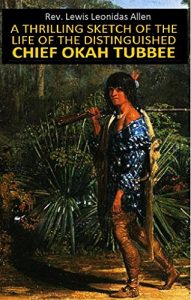In 1848 Rev. Lewis Leonidas Allen (1811 - 1877) published a book about William McCary entitled "A THRILLING SKETCH OF THE LIFE OF THE DISTINGUISHED CHIEF OKAH TUBBEE."
The subject of Allen's book , William McCary (1811 – after 1854) claimed he was a half-African American and half-Native American named Okah Tubbee and the "lost" son of Choctaw chief Mushulatubbee.
He was born as Warner McCary in Natchez, Mississippi around 1810 or 1811 to an African American slave named Francis, or "Franky", and her master, a white carpenter from Pennsylvania named James McCary. They also had two older children, Kitty and Robert. Upon James McCary's death around 1813, his will emancipated Franky and the older children but declared Warner and his future offspring to "be held as slaves during all and each of their lives" in the service of his mother and siblings. In 1836 he escaped Natchez on a riverboat and went to New Orleans, where he worked at Leeds Foundry until 1840, as well as an occasional musician and cigar vendor. Around this time he married a Native American woman, Laah Ceil, whose mother was Delaware Indian and father was Mohawk.
In his youth, Warner McCary had begun using other names, including James Warner, William McCary, and Cary. He eventually adopted over a dozen aliases, many of which were Native American, including William Chubbee, William Chubbee King, Julius McCary, William McChubby, Okah Tubee, James Warner, and War'ne'wis Ke'ho'ke Chubbee. According to Connell O'Donovan, McCary used these alternate identities "to both reinvent and reimagine his unhappy childhood, and to make his way and a living as an escaped slave in a white-dominant world."
Presenting himself as a Native American, McCary was helped in 1843 by local whites to get a permit as a free person of color in Mississippi. When he left in 1844, he toured various frontier and eastern cities as a musician and lecturer.[1] During this time he briefly joined with Mormonism where he sparked racial controversy.
One publication of the "chief's" time apparently saw through the claims of Native American ancestry, stating;
"The celebrated Indian chief Okah Tubbee, noted for his performances on the flute, is said to be none other than Carey, a negro, or rather mulatto, who lived in Louisiana some ten or twelve years since: He was an excellent performer on the fife, flute, and other musical instruments, and belonged to the band of the old Louisville Guards, and when this fine company paraded he discoursed his music to the infinite delight of the crowds of urchins who “followed the sogers.” Carey thought it would prove more profitable to turn Indian, and for several years he has been “starring” it through the country as Dr. Okah Tubbee, giving concerts, &c. He has shown himself to be a worthy rival of the prince of humbugs. He claims to be an Indian chief, and that his wife, who assists at his concerts, is an Indian princess."
The subject of Allen's book , William McCary (1811 – after 1854) claimed he was a half-African American and half-Native American named Okah Tubbee and the "lost" son of Choctaw chief Mushulatubbee.
He was born as Warner McCary in Natchez, Mississippi around 1810 or 1811 to an African American slave named Francis, or "Franky", and her master, a white carpenter from Pennsylvania named James McCary. They also had two older children, Kitty and Robert. Upon James McCary's death around 1813, his will emancipated Franky and the older children but declared Warner and his future offspring to "be held as slaves during all and each of their lives" in the service of his mother and siblings. In 1836 he escaped Natchez on a riverboat and went to New Orleans, where he worked at Leeds Foundry until 1840, as well as an occasional musician and cigar vendor. Around this time he married a Native American woman, Laah Ceil, whose mother was Delaware Indian and father was Mohawk.
In his youth, Warner McCary had begun using other names, including James Warner, William McCary, and Cary. He eventually adopted over a dozen aliases, many of which were Native American, including William Chubbee, William Chubbee King, Julius McCary, William McChubby, Okah Tubee, James Warner, and War'ne'wis Ke'ho'ke Chubbee. According to Connell O'Donovan, McCary used these alternate identities "to both reinvent and reimagine his unhappy childhood, and to make his way and a living as an escaped slave in a white-dominant world."
Presenting himself as a Native American, McCary was helped in 1843 by local whites to get a permit as a free person of color in Mississippi. When he left in 1844, he toured various frontier and eastern cities as a musician and lecturer.[1] During this time he briefly joined with Mormonism where he sparked racial controversy.
One publication of the "chief's" time apparently saw through the claims of Native American ancestry, stating;
"The celebrated Indian chief Okah Tubbee, noted for his performances on the flute, is said to be none other than Carey, a negro, or rather mulatto, who lived in Louisiana some ten or twelve years since: He was an excellent performer on the fife, flute, and other musical instruments, and belonged to the band of the old Louisville Guards, and when this fine company paraded he discoursed his music to the infinite delight of the crowds of urchins who “followed the sogers.” Carey thought it would prove more profitable to turn Indian, and for several years he has been “starring” it through the country as Dr. Okah Tubbee, giving concerts, &c. He has shown himself to be a worthy rival of the prince of humbugs. He claims to be an Indian chief, and that his wife, who assists at his concerts, is an Indian princess."












